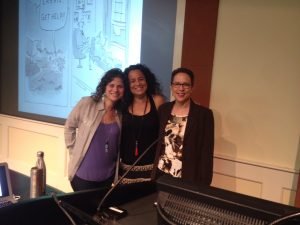I’m Breathing, Intentionally
 On Thursday May 12, the REACH staff attended a program in Boston – with the incredible help of volunteers, we were able to bring almost every full and part time staff member. This wasn’t a training like we usually attend to understand housing, a new law, benefits, or school access for kids who are homeless. This was a full day talking about “trauma stewardship” with Laura Van Dernoot Lipsky and 300 of our colleagues from Jane Doe Inc. (JDI) member programs and allies.
On Thursday May 12, the REACH staff attended a program in Boston – with the incredible help of volunteers, we were able to bring almost every full and part time staff member. This wasn’t a training like we usually attend to understand housing, a new law, benefits, or school access for kids who are homeless. This was a full day talking about “trauma stewardship” with Laura Van Dernoot Lipsky and 300 of our colleagues from Jane Doe Inc. (JDI) member programs and allies.
What is trauma stewardship you ask? “Trauma stewardship explores how humans are impacted by exposure to the suffering, hardship, crisis and trauma of humans, other living beings and the planet itself. This impact is held within a larger context of systematic oppression and liberation theory and is addressed from an individual, organizational, systemic and societal based model.”
Are you still asking?
First, let’s talk about trauma. In the wild, animals are frequently exposed to predators and environmental threats – traumatic experiences. The primitive fight/flight/freeze response floods their nervous system and they react. The reaction might be to fight ferociously, to run (fast) or to freeze (and then run fast, or as Laura pointed out in her presentation, they might fight with another animal, then mate or possibly sleep). In each case, they are finding a way to release what has built up in their body – they are able to recover from the trauma response.
Humans don’t really do that. Modern American humans actually seek ways to hold it all in. We ignore emotional pain, we demand stoicism, shame crying, and demand composure. “Man up.” “Don’t be such a girl.” “Be strong.” This effort to keep it in doesn’t really work. Like water, pain finds a way. And like water, it will cause destruction – eroding even the strongest surfaces over time.
Because we don’t handle trauma well in our society, we have built another layer of people whose job it is to deal with the trauma impacting our fellow men and women. The pains of oppression, exclusion, abuse and violence lead to crime and more abuse and violence. Hurt people hurt people. This second layer of people is there to respond, to help, to counsel, to believe, to support. This group is hearing and seeing and holding things that – at this secondary point – still have the power to cause pain. This is secondary or vicarious trauma and it is just as insidious. The system – this second layer of people that includes law enforcement, emergency medical response, child welfare, counseling, advocates – take in the pain of multitudes every day. If they are unable to find the space or the strategies for releasing that pain, it builds up. Again, pain finds a way – either get it out or it will erode a path; this is what Laura calls the “trauma exposure response.”
The trauma exposure response is “the transformation that takes place within us as a result of exposure to the suffering of other living beings or the planet.” Given the content of a daily news feed, I might argue that we are all experiencing a trauma exposure response. And I will argue that those who do work that is flooded with trauma experience this response that much more.
Trauma stewardship is about recognizing this impact and being intentional about how we live with that impact. Laura and the Institute advocate that by developing a deep sense of awareness of the need to care for ourselves while caring for others and the world around us, by

creating space for creativity, finding balance, choosing our focus and building community, we can reduce the likelihood of “numbing out.” With humor, evidence, and compassion, Laura helps us name what is happening. By naming the pain, the guilt, the fear and the isolation, we can also name the impact we are having on family and loved ones. The ability to notice this and be mindful about our decision to do our work enables us to shift our approach from guilt (“not doing enough!”) or hopelessness to one of gratitude. We can feel grateful for the opportunity to share our strength and be there for another; and we can be grateful that we have the knowledge and skills to release our pain in healthy ways.
Because this work is not just about survival. This work should not just be about staying alive. It should be about staying well. By staying well, we are able to stay in relationship with other people. By staying in relationship with others, we create and sustain community. And with that comes a sense of a shared future. And that is how we reach beyond – domestic violence, yes, and also sexual violence, racism, sexism, homophobia, classism, ableism, xenophobia – and on and on until there is peace.
So we breathe. Intentionally. We speak. Intentionally. We run, do yoga, drink lots of water, laugh, sing, dance, hug, swim, cook, and meditate. Intentionally. We create space in our lives for enjoying other people, creatures and the earth. We make sure we always have a “Plan B” so we truly are making a choice each day to do this work. If I wasn’t doing this work, I would have a dog walking/day care business.
What would you do?
JDI hosted two days of the Trauma Stewardship program last week. The events in Boston and Springfield were the beginning of the coalition’s new Initiative for Safety and Justice. The ISJ was established with major support from the New England Patriots Charitable Foundation and will engage those providing advocacy, support organizations, and mobilize current and emerging leadership. The investment by the Patriots Foundation is meaningful in that it provides the means to bring people together, to share and learn and support each other in this work. This is a movement to end violence, as well as a system for addressing the impacts of violence. Support like that from the Patriots Foundation will help reinvigorate the movement for change so that perhaps someday the system won’t be necessary.





